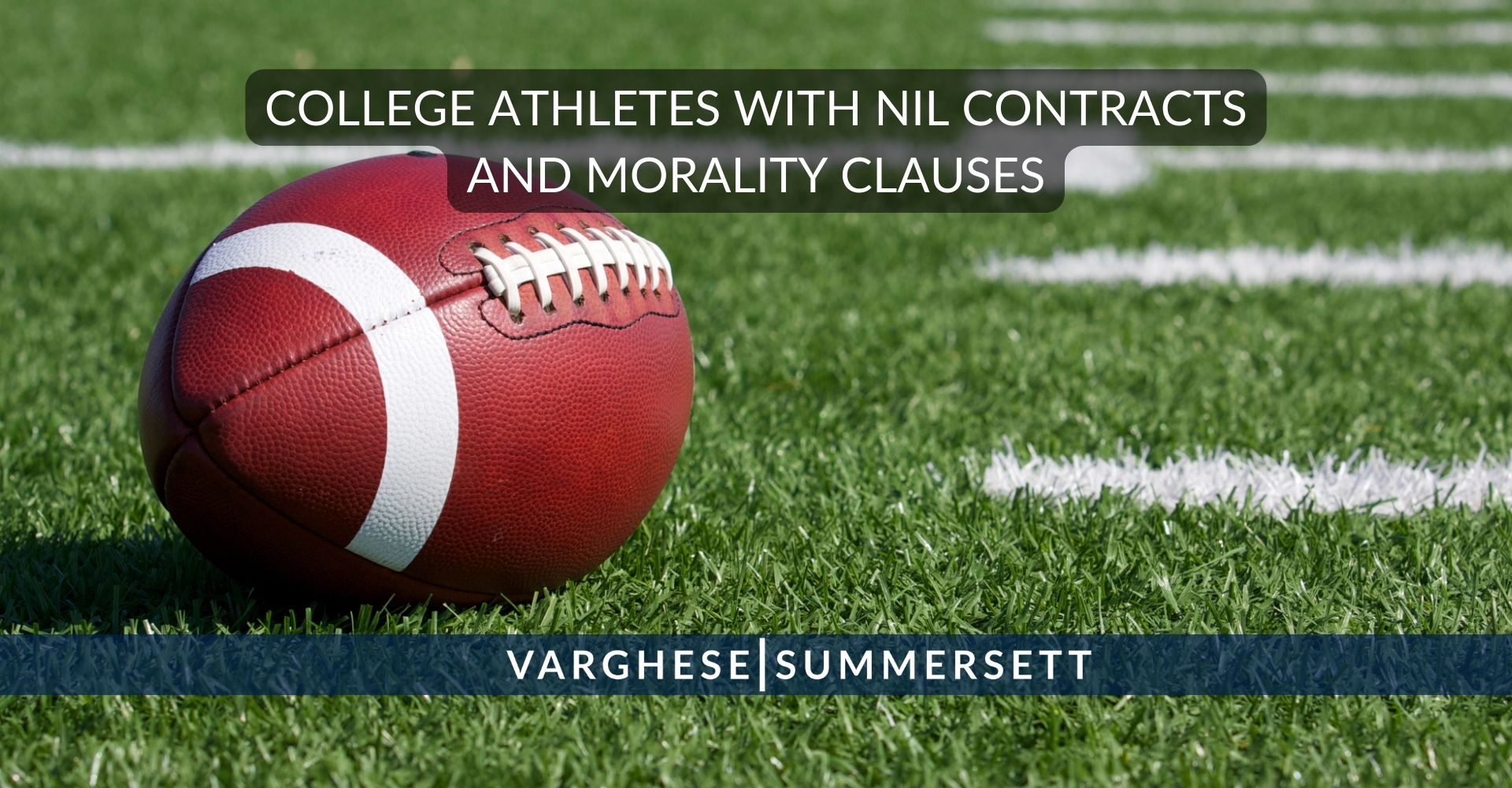What happens when you get arrested while you have a morals clause?
Many corporate officers, entertainers, and athletes have morals clauses. In this article, we explore what happens when you are arrested while you have a morals clause. We will go through everything we can do to try to help save your contract.

What is a Morals Clause?
A morals clause is a provision in a contract that requires an individual to adhere to certain standards of behavior. These clauses are often included in employment contracts, especially for high-profile positions such as entertainers, athletes, executives, and public figures. The primary purpose of a morals clause is to protect the employer’s reputation and business interests by ensuring that their employees or representatives do not engage in conduct that could be considered unethical, illegal, or damaging to the company’s image.
When Do Employment Contracts Have Morals Clauses?
Employment contracts typically include morals clauses in situations where the employee’s personal conduct could significantly impact the employer’s brand, reputation, or business. Common contexts where morals clauses are found include:
- Entertainment and Sports: Actors, musicians, athletes, and other public figures whose actions are closely scrutinized by the media and public.
- Corporate Executives: High-level executives and key employees whose actions could affect the company’s reputation and shareholder confidence.
- Public Figures and Influencers: Individuals whose public image is integral to their role and the entities they represent.
- Teachers and Coaches: Professionals in roles that serve as role models and have a duty to uphold certain ethical standards.

- Student-Athletes: NIL (Name, Image, and Likeness) contracts often include moral clauses. These clauses are designed to protect the reputation of the businesses and organizations that enter into agreements with student-athletes.
What Happens if You Are Being Investigated and You Have a Morals Clause?
If someone makes an accusation against you, there are a number of things we will do. First and foremost, we want to avoid an arrest if at all possible. This is difficult for many reasons. First and foremost, you can be arrested on just probable cause – which is just facts that suggest an offense took place. As a result, just a person saying something happened is often enough to result in an arrest, particularly for allegations of assault or sexual assault. Nonetheless, we are experienced at have conversations to try to get detectives to consider other evidence (although never your own statement) such as video evidence, receipts, other witness statements, mitigation evidence, and evidence as to the alleged victim’s motivations, such as this is nothing more than a money grab. We also meet with prosecutors who might be in a position to accept or reject the case. While they may take the official position that every case is handled the same and they won’t have any direct input on whether the case is filed or not, we know this is only partially true. Moreover, we must do this to prevent what often happens: police and prosecutors trying to overcompensate this idea that “everyone is treated the same” by making an example of a public figure. The reality is not everyone is treated the same though. If you are a blue-collar worker, being arrested for an allegation is very different than if you have a morals clause that could affect your current and future employment. A prosecutor or detective with true discernment understands this. Being fair doesn’t mean treating everyone exactly the same. If that were the case, prosecutors and police could be replaced by technology. With that said, it takes real courage for a prosecutor or detective to do the right thing (like the prosecutor on Scottie Scheffler dismissing his charges), and you have to be prepared for the great likelihood of an arrest.
What Happens if You Are Arrested and You Have a Morals Clause?
If you are arrested for a criminal offense, our strategy is to do everything humanly possible to get your case dismissed. The faster we can find a pathway to a dismissal, the more chances we have to get on the right side of things with your employer. We have had conversations with employers explaining how easy it is to have a case filed against a person, particularly when the law only requires probable cause for an arrest, and the detective is not required by law to consider defenses or mitigation. In other words, the standard for an arrest is far lower than even the civil standard of proof at a trial, which is the preponderance of evidence. Without immediate intervention, being arrested while you have a morals clause can result in the following:
- Internal Review: Your employer may conduct an internal review to assess the situation and determine if your conduct violates the morals clause.
- Suspension: Pending the outcome of the review, you might be suspended from your duties.
- Termination: If it’s determined that your conduct violates the morals clause, you could be terminated from your position.
- Reputation Damage: The arrest and any subsequent negative publicity could harm your professional reputation, making it difficult to secure future employment.
- Clawback Provisions: Some morals clauses include provisions that allow the company to reclaim payments already made to the individual. This can include bonuses, salaries, or other financial benefits.
- Fines: The contract may specify fines or other financial penalties for violating the morals clause.
How to Defend Yourself and Not Violate the Morals Clause if You Are Arrested
Here are some steps to take if you are arrested and want to defend yourself without violating the morals clause:
- Call Us: Call us immediately to understand your rights and obligations. We will guide you through the legal process and help you prepare a defense.
- Send us the Contract: We will carefully review your employment contract, specifically the morals clause, and discuss with you what behaviors constitute a violation.
- Manage Public Relations: We are (to our knowledge) unique in the criminal defense space as a firm with a Chief Content Officer who was a reporter for a number of years and has a network of fellow reporters throughout Texas and across the United States. We will be prepared for the possibility that your name is mentioned by the media and be ready with statements and a public response if needed.
- Gather Evidence: We will collect any evidence or witnesses that can support your case and demonstrate that your behavior does not violate the morals clause.
Legal Considerations in Sports: Morals Clauses
Recent scandals in the sports world have painfully demonstrated to some athletes that the salary clause in their player contracts and endorsement contracts is not the only contractual term that deserves substantial attention during the negotiation process. Most player contracts and endorsement contracts contain a “morals clause,” which gives the athlete’s team, league, or company paying the athlete to endorse its products the right to terminate a contract or otherwise punish a player who engages in criminal or unseemly behavior.
Although a morals clause may sometimes be treated as “boiler plate” in contracts, violation of a morals clause can have a huge economic impact, from loss of salary paid by a team to the loss of lucrative endorsement deals. Rather than waiting until some incident has landed them in the headlines to look at the morals clause in their contract, players should understand in advance what triggers the clause and what each side is allowed to do if the clause is invoked.
Examples of Morals Clause Violations
The list of athletes and other sports professionals who have been suspended or terminated from teams, fired from coaching jobs, or lost lucrative endorsement contracts because of illegal, immoral, or unethical conduct that violated a morals clause in their contract has grown longer recently:
- Michael Vick: Convicted of bankrolling an illegal dog fighting operation and sentenced to 23 months in prison. Nike suspended and eventually terminated its endorsement agreement with him.
- Adam (Pacman) Jones: Suspended for the entire 2007 season by the NFL, without pay, after five arrests and violating probation.
- Kobe Bryant: Lost numerous endorsements due to sexual assault charges, though he later regained some endorsements.
- Rick Neuheisel: Fired from his coaching job at the University of Washington for violating NCAA rules that prohibited gambling. He is now the UCLA coach.
Negotiating Morals Clauses in Contracts
Negotiating morals clauses in player contracts can be very different than negotiating them for endorsement contracts. Major league player contracts usually don’t allow much room for negotiation because they contain uniform language for all players. Led by the NFL’s personal conduct policy, player contracts nowadays are likely to contain more specific and stringent restrictions on player conduct off the field. They may require the player to dress neatly in public, to conduct himself according to the highest standards of honesty and sportsmanship, and to refrain from doing anything that would be detrimental to the best interests of the team or league.
But language specific to particular player contracts can be negotiated. For example, Yankees designated hitter Jason Giambi admitted to having used steroids, which could have been cause to terminate him, but the Yankees declined to do so, perhaps because of his value to them, but also because reportedly during the negotiation of his contract language that could have provided grounds for termination based on steroid use had been changed.
Morals Clauses in Endorsement Deals
A morals clause in an endorsement deal can be much more detailed than a standard player contract and allows for more negotiation, depending on the player’s bargaining position. Companies insist on a morals clause because the company is investing a large sum of money to have a player be the public face for the company’s products; the company builds its advertising and marketing campaign around the player so that the player’s talents and achievements become associated with the company’s products. Problems arise when the player’s talents and achievements are overshadowed by scandal or criminal conduct. When the association between the player-endorser and the company begins to damage the company, the company understandably wants to part ways.
Negotiating the Morals Clause
When negotiating the morals clause in an endorsement agreement, one of the most important issues is what kind of behavior will trigger the clause. In general, a player will want a short list of actions that will trigger the clause, such as a conviction on criminal charges. A company paying for the endorsement will want a broadly worded clause that lets the company act, at its sole discretion, if the player’s actions warrant termination or a fine. For example, there are many kinds of behavior that fall short of a conviction that could tarnish a company’s image, such as public fights, arrests for drunk driving, drug use, criminal accusations (even if the charges are later dropped), and domestic scandals. A company may also want to be able to take action if the player-endorser criticizes its product or management.
A relatively new twist is a reverse-morals clause, which allows a player to terminate an endorsement agreement if the company engages in fraud or other criminal activities.
Conclusion
If you are arrested or under investigation while you have a morals clause, call us immediately. These are complicated
Morals clauses are now standard in most sports contracts, as sports professionals are under increasing scrutiny from tabloids and the news media. Behaviors that might have gone unnoticed or were kept out of the public eye a few years ago are now on the front pages in a matter of hours. Teams and leagues, and the companies that pay athletes to endorse their products, are increasingly faced with the question of how to respond to scandals. One of the first things they look at is the morals clause in the player or endorsement agreement. This means athletes should pay close attention to these clauses during contract negotiations.
By understanding what actions trigger the clause and negotiating the terms carefully, players can protect themselves from severe consequences and safeguard their careers and financial interests.

